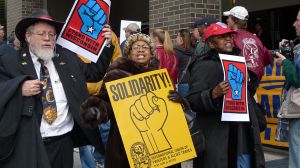
Wisconsin Union Workers march in 2011 in Washington, DC (photo: Susan Melkisethian/CC 2.0)
Labor Day’s here and with it certain traditions: parades and end-of-summer picnics and barbecues, to name but three.
Actually, here in New York City, the official Labor Day parade is now held the weekend after because too many workers are off at the aforementioned picnics and barbecues, unavailable to march on the actual holiday. I tell you this in my capacity as president of a small AFL-CIO affiliated union, the Writers Guild of America, East, and also unequivocally can say there are few things as much fun as walking up a momentarily closed-to-traffic Fifth Avenue with brass bands and floats, even if there are more of you on the street than locals and tourists out on the sidewalks watching.
Another Labor Day tradition: the annual posse of pundits in the media bemoaning the fate of unions and proclaiming their imminent demise. Not necessarily so, according to a compact new report from Robert A. Borosage of the Campaign for America’s Future. “What would begin to revive a broad middle class, to generate a prosperity that can be widely shared?” Borosage asks. “There are many policies that can help: progressive taxation, strengthened safety-net programs, a higher minimum wage, full employment policies and more.”
But, if history is any guide, the most important policy is too often the least mentioned: workers regaining a voice at work, through organizing and broad-based collective bargaining. The power to bargain across entire sectors of the economy enables workers to demand a fair share of the profits and productivity they help to create. A voice at work limits executive excesses and curbs wage theft and other fair labor violations.
At the peak of organized labor’s power, Borosage writes, “workers became more productive, wages rose at about the same pace. And America grew together, with the incomes of working people actually rising somewhat faster than incomes at the top…”
Although unions sometimes failed to live up to them, the values represented by worker organization – solidarity, mutual aid, dignity of work – served to temper the competitive dog-eat-dog ethos of the market economy. Unions helped educate members, giving them direct experience in democracy and self-governance, while providing a central source of community volunteers and activism.
Despite diminished membership, fierce conservative attacks on unions representing public workers, rules and policies that have “stacked the deck” against working people and a perception by many that unions “are no longer needed or relevant to the new service, high-tech, global economy,” steps have begun toward restoring workers’ rights.
Borosage points to alliances with fast-food workers and other low-wage earners, as well as progressive movements in the Los Angeles and San Francisco city governments pushing for a living wage, universal health care and minimum labor standards for employers. He writes, “To respond to the transformation of the workplace and the spread of contingent jobs, workers will need to find new ways of joining with consumers in creative protests.”
What is clear is that empowering workers must be at the center of any agenda that claims to provide a remedy to our Gilded Age inequality or a path to more widely shared prosperity. If capital is mobilized and workers are not, growing inequality is virtually inevitable and the middle class will continue to sink. Only if workers are organized does the democracy have a chance to insure that the American dream becomes a reality and not a myth.
Read Robert A. Borosage’s complete report, “Inequality: Rebuilding the Middle Class Requires Reviving Strong Unions.”


